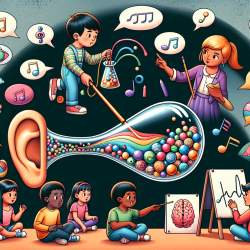Introduction
In the realm of child development, the influences of parental experiences on children's emotional and behavioral outcomes are profound. A recent study titled "Maternal gender discrimination and child emotional and behavioural problems: A population-based, longitudinal cohort study in the Czech Republic" provides critical insights into how maternal experiences of gender discrimination can impact child development. This blog aims to explore the findings of this study and discuss how practitioners can leverage these insights to improve child outcomes.
The Study: A Brief Overview
The research conducted by Stepanikova et al. (2022) utilized data from the European Longitudinal Cohort Study of Pregnancy and Childhood-Czech (ELSPAC-CZ). It examined the effects of maternal perceived gender discrimination on children's emotional and behavioral problems. The study followed 2,567 mother-child pairs from pregnancy until the child reached 15 years of age. Using the Strengths and Difficulties Questionnaire (SDQ), the study assessed children's emotional and behavioral difficulties at ages 7, 11, and 15.
Key Findings
- 11.2% of mothers reported experiencing gender discrimination during mid-pregnancy.
- Children of these mothers exhibited higher levels of emotional and behavioral problems compared to children whose mothers did not report such discrimination.
- The study found that maternal depressive symptoms and financial hardship mediated the relationship between perceived gender discrimination and child outcomes, accounting for 37% and 13% of the total effect, respectively.
- Boys, first-born children, and children from families experiencing financial hardship were more affected.
Implications for Practitioners
For practitioners in speech language pathology and related fields, these findings underscore the importance of considering parental experiences and socio-economic factors when assessing and planning interventions for children. Here are some actionable steps:
- Holistic Assessment: Incorporate questions about parental experiences of discrimination and socio-economic stressors during assessments.
- Interdisciplinary Collaboration: Work closely with psychologists and social workers to address the broader socio-emotional context of the child.
- Family-Centered Interventions: Develop interventions that support not only the child but also the mental health and well-being of the parents.
- Advocacy and Education: Educate families about the potential impacts of discrimination and advocate for supportive community resources.
Encouraging Further Research
While this study provides valuable insights, it also highlights the need for further research into the mechanisms by which gender discrimination affects child development. Practitioners are encouraged to contribute to this body of research by documenting and sharing their observations and outcomes from interventions.
Conclusion
The study by Stepanikova et al. (2022) is a pivotal contribution to understanding the intergenerational effects of gender discrimination. By integrating these insights into practice, speech language pathologists and other child development professionals can better support children and families facing these challenges.
To read the original research paper, please follow this link: Maternal gender discrimination and child emotional and behavioural problems: A population-based, longitudinal cohort study in the Czech Republic.










